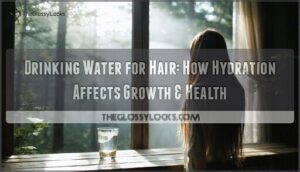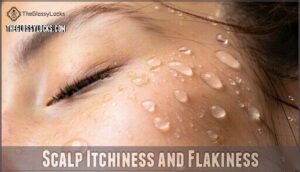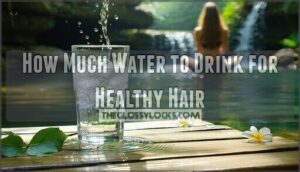This site is supported by our readers. We may earn a commission, at no cost to you, if you purchase through links.

When your body runs low on water, it prioritizes key organs over your follicles, fundamentally putting your hair on a starvation diet. This internal drought creates a cascade effect: follicles weaken, growth cycles shorten, and strands become fragile.
The good news? Adjusting your water intake can reverse these effects faster than you’d expect, transforming your hair from the inside out.
Table Of Contents
- Key Takeaways
- Why Hydration Matters for Hair Health
- How Drinking Water Supports Hair Growth
- Signs Your Hair Needs More Hydration
- Can Hydration Help Prevent Hair Loss?
- How Much Water to Drink for Healthy Hair
- Lifestyle Tips for Hydrated, Healthy Hair
- Additional Benefits of Drinking Water for Hair
- Frequently Asked Questions (FAQs)
- How long does it take to see results from drinking more water?
- What are the best ways to make drinking water more appealing?
- Is drinking too much water bad for your hair or scalp?
- Is it possible to drink too much water?
- How much water should I drink if I am pregnant or nursing?
- Does water temperature affect hair growth results?
- Can overhydration damage hair or scalp health?
- How long until hydration improves hair appearance?
- Do hair type differences change water needs?
- Should you apply water directly to hair?
- Conclusion
Key Takeaways
- Water makes up 25% of each hair strand’s weight, and when you’re dehydrated, your body redirects fluids to vital organs instead of your hair follicles—essentially starving them and triggering brittle strands, stunted growth, and increased shedding.
- Proper hydration directly extends the anagen (active growth) phase of your hair cycle while preventing premature entry into the telogen (resting) phase, which means more of your follicles stay productive instead of going dormant.
- Most adults need 11.5 to 15.5 cups of fluid daily to support healthy hair, and you’ll typically see texture improvements within 2-4 weeks while meaningful regrowth takes around 3 months of consistent hydration.
- Beyond drinking water, loading up on water-rich foods like cucumber and watermelon, avoiding dehydrating beverages like coffee and alcohol, and using sulfate-free, water-based hair products creates the ideal internal and external environment for stronger, shinier hair.
Why Hydration Matters for Hair Health
Your hair’s health starts from the inside out, and water plays a bigger role than you might think. When you’re not drinking enough, your body prioritizes essential organs over your hair and scalp, leaving them dry and vulnerable.
Let’s look at why staying hydrated matters so much for keeping your hair strong and growing.
The Role of Water in The Human Body
Your body runs on water—around 55 to 60% of you is pure H2O, powering everything from your heartbeat to the health of your hair. Every cell depends on proper hydration to function, from regulating body temperature to flushing out toxins.
Water balance affects your metabolism, blood circulation, and even how nutrients reach your scalp. Without adequate fluid intake, your body prioritizes essential organs first—meaning your hair and skin often show the earliest signs of dehydration.
How Dehydration Impacts Hair and Scalp
When you skimp on water intake, your hair and scalp feel it fast. Dehydration effects show up as brittle strands that snap easily, a dry and itchy scalp, and sluggish hair follicle activity that slows growth.
Your scalp’s natural moisture barrier weakens, triggering inflammation and making hair loss more likely. Poor hydration also means less blood flow to your roots, so nutrients can’t reach where they’re needed most—leaving you with dull, fragile hair that breaks under the slightest tension.
Understanding the role of hair hydration is essential for maintaining healthy hair.
Body Water Content and Its Effect on Hair
Since roughly 55 to 60 percent of your body is water, staying hydrated isn’t just about quenching thirst—it directly impacts whether your hair grows strong or struggles to survive. When your hydration levels drop, your scalp health suffers first, cutting off moisture to each strand.
Your body water content governs:
- Hair moisture retention—keeping strands flexible instead of brittle
- Fluid intake balance that fuels cell turnover in follicles
- Water balance needed for nutrient transport to roots
Without proper body hydration, your hair can’t maintain its natural resilience.
How Drinking Water Supports Hair Growth
You already know water keeps you alive—but it also keeps your hair growing. Proper hydration nourishes every stage of the hair growth cycle, from strengthening follicles to delivering nutrients where they’re needed most.
Let’s break down exactly how drinking enough water creates the conditions your hair needs to thrive.
Water’s Role in The Hair Growth Cycle
Water intake directly influences which phase your hair follicles occupy at any given time. When hydration levels drop, your body can push follicles out of the active growth phase—called anagen—and into the resting telogen phase prematurely. That’s why adequate water absorption facilitates longer growth cycles, keeping more of your hair actively producing new strands rather than shedding. Proper hydration is essential for maintaining healthy hair through hair growth processes.
| Growth Phase | Duration | Impact of Dehydration |
|---|---|---|
| Anagen (Growth) | 2–7 years | Shortened by poor hydration |
| Catagen (Shift) | 2–3 weeks | Accelerated entry from anagen |
| Telogen (Rest) | 2–3 months | Increased follicle percentage |
Proper scalp moisture and consistent water intake help maintain hair follicle health, ensuring that around 85–90% of your hair stays in the growth phase where it belongs.
Hydration and Active Hair Follicles
Your follicles need a steady stream of hydration to stay active and keep producing healthy hair strands. When you maintain proper water balance, you’re basically keeping those follicles energized—they absorb moisture through your scalp’s microcirculation, which aids ongoing hair regrowth.
Without consistent hydration, follicle health declines, stunting new strand production and weakening hair moisture levels. That’s the direct link between your water intake and visible hair health benefits.
Blood Flow and Nutrient Delivery to Hair
Proper hydration boosts circulation, so your blood carries more oxygen and essential nutrients—like vitamins, minerals, and amino acids—directly to your hair follicles where growth actually happens.
Think of your circulatory system as a delivery network: when you’re well-hydrated, blood vessels expand slightly, improving vascular health and speeding up nutrient uptake.
That enhanced oxygen delivery and nutrient absorption keep follicles nourished, which translates to stronger, more resilient hair growth over time.
Signs Your Hair Needs More Hydration
Your hair has a way of signaling when it’s running low on hydration—you just need to know what to look for. Dehydration doesn’t always announce itself with obvious symptoms, but your strands and scalp will give you clues.
Here are the most common signs that your hair needs more water.
Brittle, Dry, or Thinning Hair
When your hair starts feeling more like straw than silk, your body’s probably waving a red flag about dehydration. Without proper moisture, you’ll notice these warning signs:
- Strands snap easily – Hair breakage prevention starts with hydration, since dehydration weakens your hair’s structure
- Texture feels rough – Poor hair moisture balance makes every strand coarse and difficult to manage
- Volume looks flat – Thinning hair causes often trace back to inadequate scalp hydration tips being ignored
- Ends split constantly – Dry hair remedies won’t work if you’re not addressing the root cause: insufficient water intake
- Growth slows down – Hair health depends on consistent moisture to keep follicles functioning properly
Scalp Itchiness and Flakiness
That constant urge to scratch your scalp isn’t just annoying—it’s your body telling you something’s off with your hydration levels. When you’re not drinking enough water, your scalp can’t produce the sebum it needs to stay moisturized, leading to dryness that causes an itchy scalp and flaky skin.
| Symptom | What It Means | Hydration Link |
|---|---|---|
| White flakes | Dandruff from dry scalp conditions | Poor scalp health due to dehydration |
| Persistent itching | Irritated, under-hydrated skin | Scalp needs more internal moisture |
| Tight feeling | Dehydrated scalp tissue | Body prioritizing water elsewhere |
Staying hydrated aids in dandruff prevention and helps maintain a balanced, comfortable scalp. Your scalp conditions improve when you’re consistently drinking enough water—it’s one of the simplest flake removal strategies that works from the inside out.
Increased Hair Breakage and Loss
If you’re noticing more strands on your pillow or in the shower drain than usual, dehydration might be weakening your hair at its root. When your body lacks water, hair breakage increases because strands lose their flexibility and snap more easily.
This dehydration effect on scalp health and hair follicles can accelerate hair loss, but preventing hair loss through proper hydration is achievable—recognizing the importance of hydration is your first step toward hair restoration.
Can Hydration Help Prevent Hair Loss?
You’ve probably heard that drinking more water can help your hair, but can it actually prevent hair loss? The answer depends on what’s causing your hair to thin in the first place.
Let’s look at how hydration plays a role in keeping your hair on your head.
Reversing Hair Loss Through Proper Hydration
When hair loss stems from dehydration, restoring proper fluid intake can help reverse the damage. Hydration therapy works by rebalancing water levels in your body, which allows your scalp to produce the natural oils it needs for healthy hair regrowth.
You’re basically giving your follicles the resources they need to shift out of dormancy and back into active growth—preventing hair loss before it worsens.
Dehydration’s Link to Hair Thinning
Dehydration forces your body into survival mode—and your hair pays the price. When water levels drop, your body redirects what little moisture it has toward essential organs, leaving your scalp and follicles starved for hydration. Here’s what happens next:
- Hair strands become brittle and snap easily under stress
- Your scalp stops producing enough natural oils to protect follicles
- Growth slows dramatically as follicles slip into dormancy
This isn’t just about dry hair—it’s about actual hair thinning that worsens the longer dehydration persists.
Hair Restoration and Healthy Water Intake
Good news: bringing your hydration levels back up can actually jumpstart hair regrowth and repair some of that damage. When you restore proper fluid intake, your scalp health improves rapidly—follicles reactivate, blood flow increases, and your body can finally prioritize hair restoration instead of just keeping you alive.
| Hydration Level | Hair Health Impact |
|---|---|
| Severely dehydrated | Active hair loss, dormant follicles |
| Moderately dehydrated | Brittle strands, slowed growth |
| Adequately hydrated | Normal growth cycle resumes |
| Ideal water balance | Thicker appearance, faster regrowth |
| Sustained hydration therapy | Long-term hair restoration |
Drinking water consistently gives your follicles the environment they need to bounce back.
How Much Water to Drink for Healthy Hair
You’ve learned how hydration can help prevent hair loss—now let’s talk about how much water you actually need to drink.
Your daily water needs aren’t one-size-fits-all, and there are smart ways to boost your hydration beyond just drinking plain water.
Here’s what you need to know to keep your hair—and your whole body—properly hydrated.
Daily Water Intake Recommendations
Most health organizations recommend men aim for about 15.5 cups (124 ounces) and women target 11.5 cups (92 ounces) of total fluid intake daily. Your daily hydration levels should support healthy hair growth—though about 20% usually comes from water-rich foods.
Proper hydration means meeting these fluid intake benchmarks consistently, which helps maintain ideal water requirements for both your body and hair. Building solid drinking habits around this daily quota ensures your recommended water consumption fosters thicker, healthier strands.
Factors Affecting Individual Hydration Needs
While those general guidelines provide a solid baseline, your personal hydration needs can shift based on your activity level, climate, and even your hair type.
Physical activity increases water loss through sweat, so proper hydration becomes vital for body hydration and scalp health. Climate impact matters too—dry or hot environments demand higher recommended water consumption.
Age factors, medical conditions, and dietary influences also affect your daily hydration requirements, making tailored water intake tips essential for maintaining healthy hair.
Water-Rich Foods for Added Hydration
Beyond the water you sip throughout the day, certain foods can seriously boost your hydration status—and your hair will thank you for it. Load up on these moisture-packed options to support hair growth:
- Fruit Hydration heroes like watermelon and strawberries
- Vegetable Juice packed with nutrients
- Coconut Water for electrolyte balance
- Herbal Teas that count toward water intake
- Aquatic Greens like cucumber and celery
These choices deliver both hydration and essential vitamins your follicles crave.
Lifestyle Tips for Hydrated, Healthy Hair
Drinking enough water is just the starting point—your daily habits play a huge role in keeping your hair hydrated from the inside out. From the products you use to the beverages you reach for, small adjustments can make a real difference.
Here are a few practical lifestyle changes that support hair hydration and overall health.
Creating a Water-Based Hair Care Routine
Think of your hair care routine like a garden—internal hydration is the water that nourishes from below, while external products are the sunshine and nutrients you add on top. Start by choosing hydrating shampoo tips like sulfate-free formulas that won’t strip your scalp. Follow with water-based products—lightweight conditioners and DIY hydration masks made from aloe or cucumber. Use lukewarm rinse water temperature to avoid drying out strands.
| Routine Step | Water-Based Approach | Scalp Hydration Benefit |
|---|---|---|
| Cleansing | Hydrating shampoo with water-based ingredients | Maintains natural moisture barrier |
| Conditioning | Light, water-infused conditioners | Fosters healthy hair growth |
| Treatment | DIY hydration masks (aloe, honey) | Boosts scalp health directly |
| Rinse | Cool to lukewarm water temperature | Seals cuticles, locks moisture |
| Daily Care | Drink 8+ glasses of water | Nourishes follicles from within |
Pair scalp hydration techniques—like gentle massage during washing—with consistent drinking water habits for the best results in maintaining healthy hair and fostering hair care from every angle.
Avoiding Dehydrating Beverages
Coffee, soda, and alcohol might feel like quick pick-me-ups, but they’re quietly pulling water away from your hair follicles with every sip. Caffeine effects and sugary drink risks include dehydration that undermines hair health and slows hair growth. Instead, make smarter beverage choices:
- Replace soda with healthy infusions like mint or cucumber water
- Limit coffee to 1-2 cups daily
- Choose soda alternatives such as herbal tea or coconut water
- Swap alcohol for sparkling water with lemon
- Prioritize drinking water throughout the day to protect against hair loss
Nutrition and Its Impact on Hair Hydration
What you eat doesn’t just fuel your body—it directly determines whether your hair follicles are getting the hydration and nutrients they need to thrive. Load up on water-rich foods like cucumbers, watermelon, and leafy greens—these dietary water sources deliver hydrating nutrients that support hair mineral balance.
Omega-3s, biotin, and zinc work alongside your fluid intake to keep hair hydrated and strong, creating the foundation for hair growth and lasting hair health.
Additional Benefits of Drinking Water for Hair
Beyond supporting growth and preventing damage, proper hydration brings some welcome perks you’ll actually notice. Water doesn’t just keep your hair alive—it helps it look and feel better too.
Here’s what else changes when you drink enough water.
Thicker, Shinier Hair Appearance
When your hair looks lackluster and feels thin, inadequate hydration might be the culprit robbing your strands of their natural volume and shine. Proper hydration promotes hair thickness and strengthening from within, giving you visible results:
- Enhanced hair shine through improved hair moisture
- Fuller hair texture that feels substantial
- Better scalp health creating ideal growth conditions
- Reduced breakage leading to length retention
- Vibrant appearance reflecting overall hair health
These hydration tips transform dull strands into healthier-looking hair.
Detoxification and Scalp Health
Your body’s natural detoxification systems work overtime to keep your scalp healthy, and staying hydrated is the key to unlocking their full potential. Drinking water aids toxin removal that could otherwise compromise hair follicle function and weaken your strands.
Proper hydration promotes scalp purification by flushing metabolic byproducts while maintaining the ideal pH balance between 4.5 and 5.5 for peak scalp health. This scalp balance creates an environment where hair health benefits flourish naturally.
Reduced Dandruff and Scalp Conditions
A well-hydrated scalp doesn’t just flush out toxins—it also creates an environment where dandruff and irritating scalp conditions struggle to take hold. When you’re properly hydrated, your scalp produces balanced sebum that naturally prevents flaky skin and soothes itchy scalp issues.
This scalp soothing effect makes dandruff prevention easier, since adequate water intake promotes healthy scalp function. Regular hydration complements your scalp and hair care routine, offering one of the simplest dandruff remedies available.
Frequently Asked Questions (FAQs)
How long does it take to see results from drinking more water?
You’ll likely notice changes in your hair’s texture and appearance within two to four weeks of consistent hydration.
Hair growth follows a longer timeline—expect visible regrowth around three months as proper fluid balance nourishes healthier follicles throughout the growth cycle.
What are the best ways to make drinking water more appealing?
Try flavored water or infused drinks with fruit slices like lemon or cucumber. Carbonated options can feel more exciting.
Hydration apps help track your water intake and keep you motivated throughout the day.
Is drinking too much water bad for your hair or scalp?
Overhydration won’t harm your hair or scalp directly, but drinking excessive water can dilute essential electrolytes, potentially affecting nutrient delivery to hair follicles and compromising overall hydration balance.
Is it possible to drink too much water?
Yes, but it’s rare. Excessive water intake can dilute your body’s sodium levels, causing water overload or toxic hydration.
Proper hydration maintains fluid balance, but drinking water beyond your body’s needs disrupts that balance, potentially leading to serious health issues.
How much water should I drink if I am pregnant or nursing?
During pregnancy, aim for about 10 cups of water daily, and while nursing, increase that to roughly 13 cups.
Pregnancy hydration aids fetal development, while nursing fluids guarantee sufficient breast milk production—both vital for maternal water balance and, as a bonus, healthy hair growth.
Does water temperature affect hair growth results?
Drinking water temperature—whether you prefer cold water benefits or warm water therapy—doesn’t directly impact hair growth. What matters most is your hydration levels.
Temperature control affects comfort, not hair health benefits or hair porosity, so focus on drinking water consistently for maximum hair growth.
Can overhydration damage hair or scalp health?
While rare, excessive fluid intake can lead to water toxicity, which dilutes essential electrolytes and may impact scalp sensitivity.
However, maintaining proper hydration balance through normal drinking water habits promotes hair health and hair growth without risk.
How long until hydration improves hair appearance?
You might notice softer, smoother strands in just a few days—but real visible results like improved hair strength and hydration usually show up after 4-6 weeks of proper hydration and consistent water intake.
Do hair type differences change water needs?
Your internal hydration needs stay the same regardless of hair type.
However, curly and coily textures may benefit from water-rich foods and topical moisture due to lower sebum distribution and higher porosity levels affecting water absorption along the hair shaft.
Should you apply water directly to hair?
You can spritz water on your hair—it helps with detangling and styling. But here’s the catch: direct hydration doesn’t replace internal water intake.
Your scalp needs moisture from within to support hair growth and maintain healthy hair porosity for proper water absorption.
Conclusion
Think of your hair follicles as tiny plants in a garden—without consistent watering, they’ll never reach their full potential. Drinking water for hair isn’t just about vanity; it’s about giving your body the baseline fuel it needs to sustain growth from within.
You can’t outsource hydration to fancy products when your cells are running dry. Start tracking your daily intake, load up on water-rich foods, and watch how your strands respond.
Your hair’s transformation begins with something as simple as refilling your glass.
- https://www.theindependentpharmacy.co.uk/hair-loss/guides/understanding-how-dehydration-affects-your-hair
- https://better-notyounger.com/blogs/the-better-blog/is-dehydration-behind-your-hair-loss?srsltid=AfmBOopDw1JuWEsPkUMzLVmBlx_B2pt-lsdhdGTxqWBUFHAO7OGBT0Zo
- https://www.healthline.com/health/chronic-dehydration
- https://www.usgs.gov/special-topics/water-science-school/science/water-you-water-and-human-body
- https://pubmed.ncbi.nlm.nih.gov/32949101/











